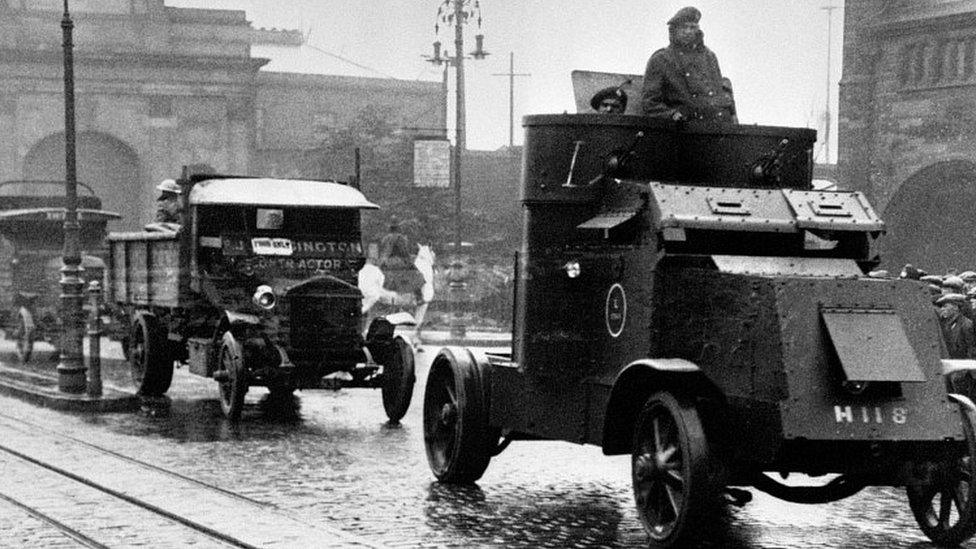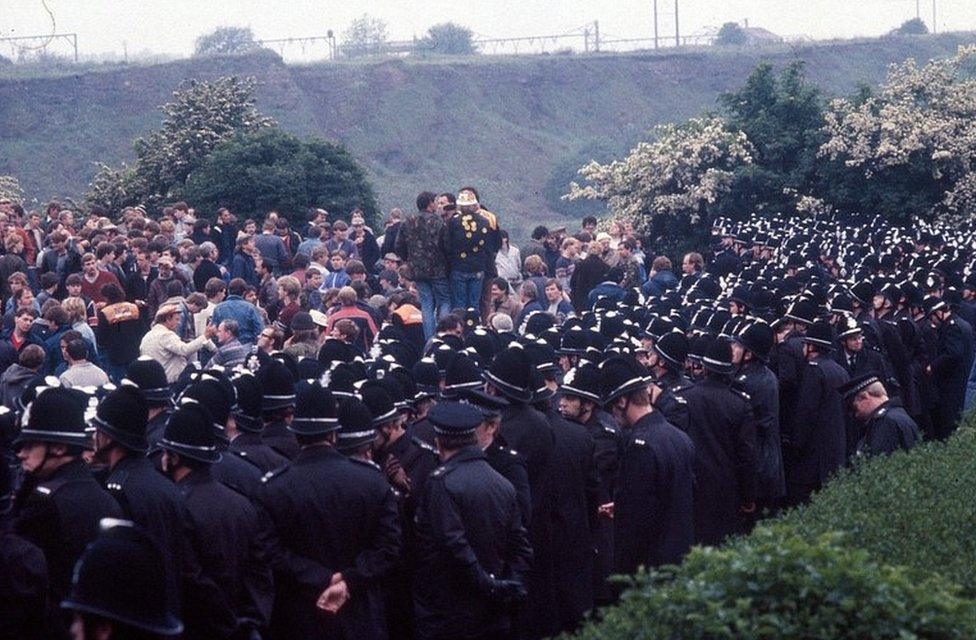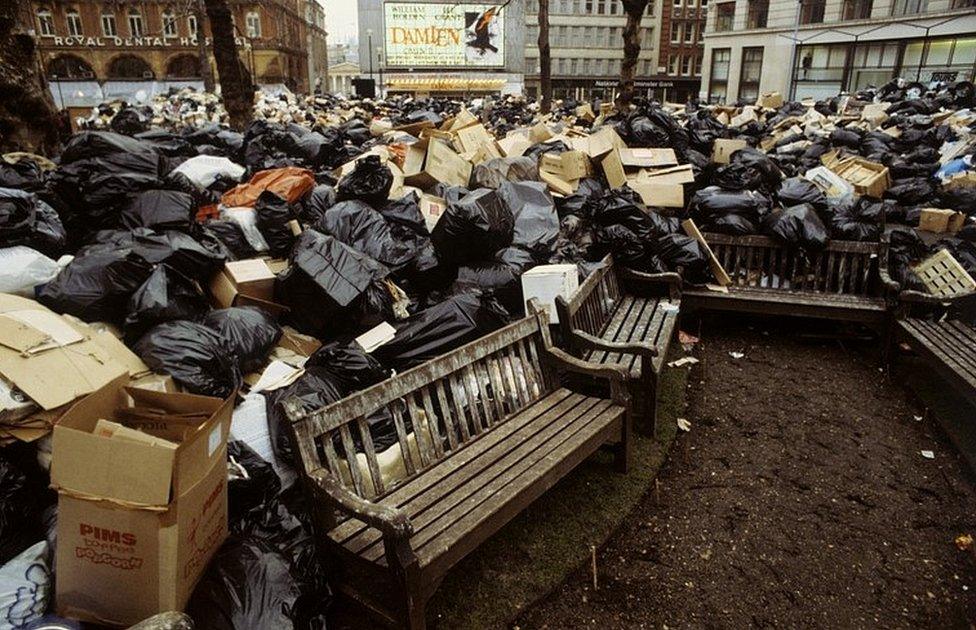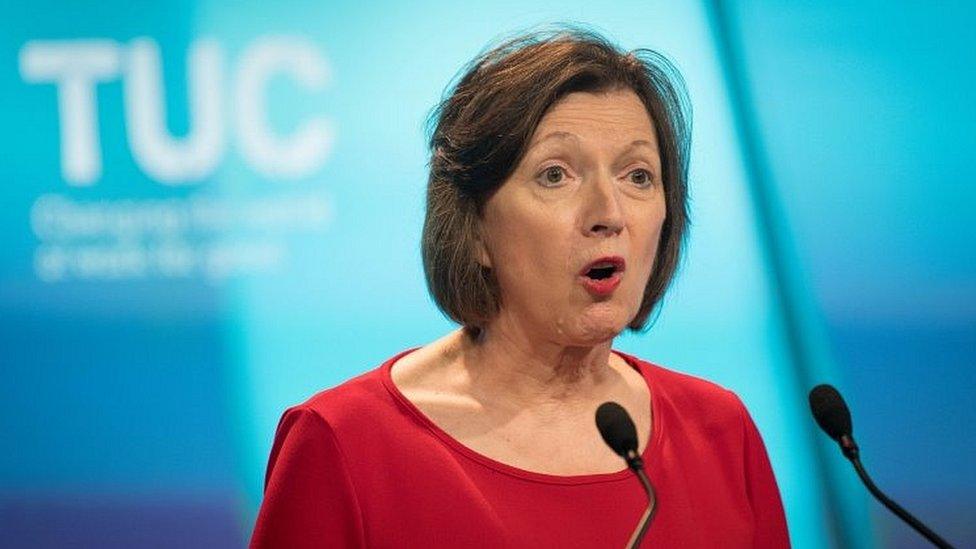Are we set for a general strike?
- Published

Some workers required a military escort during the great strike of 1926
With inflation soaring, unions representing several professions are threatening strikes unless their wage increases keep pace. But how widespread could the disruption become?
What is a general strike?
The dictionary definition of a general strike is "the stoppage of work by a substantial proportion of workers in a number of industries in an organised endeavour to achieve economic or political objectives".
This was last attempted in the UK in 1926, when three of the then five million trade unionists took industrial action for nine days.
There have been many strikes which have had economic and political impact since - famously the miners' strikes of the 1970s and 1980s, and the "winter of discontent" in 1978/9 which saw many public service workers withdraw their labour.
But these weren't "general" strikes, as the action was not widespread or co-ordinated enough to meet the definition.
Could we see a general strike this year?
It's highly unlikely. Only the TUC - the umbrella organisation for most of the UK's unions - can coordinate a strike of this scale.
The leader of the RMT rail union, Mick Lynch, says there are circumstances where he would call for this, but his union has only around 80,000 members.
It would need much bigger unions - such as Unite - and those regarded as more moderate, such as Usdaw, on board if it were to succeed.
However, this does not mean we will not see lots of industrial action this year.
On Thursday, Unite workers at the country's largest container port, Felixstowe, voted for strikes.
But there is the potential for much more widespread action this autumn, with teaching and nursing unions, for example, unhappy with their below-inflation pay awards.
When is a general strike not a general strike?
When it is "coordinated action". The government is accusing the various rail unions - the RMT, Aslef, the TSSA - of coordinating action in their different disputes to maximise impact.
And Mr Lynch has called for "enormous" and "coordinated" action from other unions if Liz Truss is declared the new prime minister on 5 September, after her Tory leadership run-off with Rishi Sunak.

The miners' strike of 1984/5 saw several clashes between police and picketers
That is because Ms Truss has pledged to introduce new restrictions on trade unions.
The TUC is due to meet the following week at its annual congress - or conference - in Brighton, and it could discuss coordinating opposition.
The outgoing TUC general secretary, Frances O'Grady, told the Financial Times, external the Truss proposals amounted to "a fundamental attack on a fundamental British liberty - that when the boss won't listen or compromise, workers have the right to withdraw their labour".
What are Liz Truss's proposals?
Ms Truss would raise the threshold for industrial action - insisting that there has to be 50% of all members of a union in favour of strike action for the vote to be valid - up from the current 40% in what are deemed "important public services".
But it is unlikely that this itself would provoke industrial action as, for example, that higher threshold was easily exceeded in the current RMT dispute, with a 71% turnout and 89% in favour of strike action.
People are still more likely to take action over pay and conditions than to protest against employment laws.
But one aspect of the Truss proposals - to insist during strike action that a minimum level of service is provided in some sectors, including the railways - could prove challenging for government and unions alike.
What is the difficulty for the unions?
Unions might find it difficult to ensure a minimum level of service is maintained, as they would not be able to compel members to work.
But if workers do not provide this minimum level of service, unions could potentially face legal challenges from employers, which could prove costly - as Ms Truss says, minimum service levels would be negotiated with each industry.
Mr Lynch would argue that if unions in any case did comply, it would make strike action ineffective - thus removing a weapon in any industrial dispute. He calls this anti-democratic.
What would be the difficulty for the government?
The government would want to keep the voters who switched to the Conservative Party at the 2019 general election onside.
A new prime minister will have clear priorities, but pushing new legislation through Parliament might be more of a distraction than a benefit, at least in the short term.
Ms Truss says she'll do this in her first 30 days of Parliament if she becomes prime minister, but there will be other challenges to address, including a rising energy price cap.
It is also possible that minimum service levels, where union members are paid for work days, could actually prolong some disputes.
Where does all this leave Labour?
In a tricky place. Whatever the government's difficulties, more restrictions on unions would also set a trap for Labour.
If it opposes new restrictions, the Conservatives would argue that Labour is on the side of "militant trade union barons", not "ordinary people" who suffer disruption.

Rubbish piled up in many places as binmen struck in the winter of 1978/9
But the Labour leadership would have little choice.
It would be inevitable that the party would suffer the withdrawal of substantial union funding were it to reverse commitments to repeal what they see as anti-union measures, never mind agree to new ones.
How are Labour's relations with the unions?
Sam Tarry - who used to work for rail union the TSSA before becoming an MP - was sacked from Labour's front bench on Wednesday.
He joined an RMT picket line in London on Wednesday and gave what the party leadership regarded as "unauthorised media appearances".
Labour leader Sir Keir Starmer said on Thursday that Mr Tarry had "made policy on the hoof".
For his part, Mr Tarry believes party and union relations are at a lower ebb than under Tony Blair. And his allies believe the tide could be turning on the Starmer leadership.

The TUC's Frances O'Grady has been highly critical of Liz Truss's proposed union law reforms
I understand Mr Tarry has been speaking to leading figures in some Labour-backing unions, such as Unite, the CWU, GMB, and his own union the TSSA.
He picked up not just opposition to his own sacking, but concerns that Sir Keir seemed to have ditched or called into question previous policies such as public ownership of the railways.
His allies say there was dismay at what we seen as dithering and drift at the top of the party.
This does not mean there will be a leadership challenge, but it does mean there could be a prolonged period of tension.
And some on the left of the party are predicting that if more "sympathetic" workers such as medical and teaching staff take action, the Starmer "stay-off-the-picket-line" policy might come under serious challenge.
On the upside for Sir Keir, sacking a shadow minister who defies him might help him argue that he provides strong leadership.
Are we going back to the 1970s?
Levels of industrial action in recent years have been low by historic standards.
In the "winter of discontent" in 1979 more than 29 million working days were lost to strikes.
This was down to 273,000 annually, pre-pandemic.
But with rising living costs, more strikes in more sectors are being called,
And industrial action is once again beginning to dominate political debate, posing challenges for government and opposition alike.